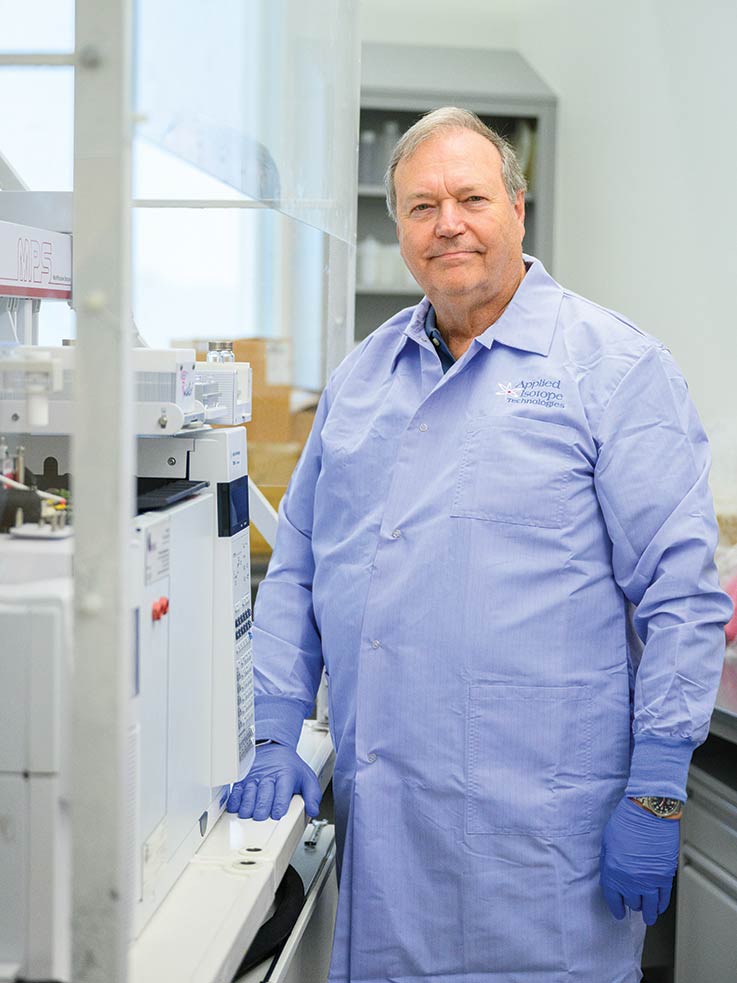In an office and laboratories on the upper floors of Kopchick Hall, Skip Kingston ’73, M’75 occupies a unique place in the life of IUP.

Skip Kingston with the robotically controlled gas chromatography mass spectrometer he donated
Kingston is a visiting scientist, or scientist in residence, continuing his work on various projects relating to analytical chemistry. It is a field he knows well, having taught the subject for 32 years at Duquesne University. He received a PhD from American University in 1978.
Now, since his retirement from Duquesne last year, Kingston has been at IUP, concentrating his study on Thor’s Hammer, a patented process that allows very accurate measurements of organic and elemental toxins, as well as health biomarkers, in very small quantities. Some blood samples he tests are so small they can be placed on a card. Yet, they provide an assessment equivalent to that of a traditional blood draw, which Kingston proved at IUP in a study for the United Kingdom’s Eden Project. Among other benefits, the blood card will make it much easier for analyses to be made in rural health settings.
The rural health aspect is timely, given the emphasis IUP’s proposed college of osteopathic medicine has placed on filling a gap in rural healthcare. In addition to that college’s dean, Miko Rose, Kingston works closely with Steven Hovan, dean of the Kopchick College of Natural Sciences and Mathematics, and Tracy Eisenhower ’00, M’02, D’18, executive director of the IUP Research Institute.
“The implications of Thor’s Hammer are profound,” Hovan said. “It offers a practical solution for frequent monitoring of health biomarkers, especially in populations with limited access to healthcare facilities.”
Thor’s Hammer represents one of some 50 patents on Kingston’s work. He has donated at least $2 million in equipment to IUP and has plans to provide more. He’s also working with faculty members to implement two undergraduate lab projects that use the equipment and that were his students’ favorites at Duquesne—analyzing their own blood and measuring Einstein’s E=mc2.
“They forget how hard I’m making them work, because they’re having too much fun,” Kingston said. “They will know how to use an instrument that is the heart and soul of research laboratories, and that’s where the jobs are.”
At Duquesne, Kingston was founder and codirector of the Center of Excellence in Mass Spectrometry, founder and director of the Center for Microwave and Analytical Chemistry, and founder of the Environmental Science and Management Program.
He arrived at IUP the first time as an undergraduate from Harrisburg after Vietnam-era military service. He met his wife, Mary Lynn Mandigo Kingston ’76, in Weyandt Hall.
Kingston received an IUP Distinguished Alumni Award in 2019 and IUP’s Sponsored Program Award for Outstanding Achievement in Research this year. He credits IUP professor emerita Augusta Syty with fostering his love of analytical chemistry. Now, as he works in Kopchick Hall, Kingston may well be engendering the same kind of love in a new generation of scientists.
“I have been to five universities, either to get degrees or to teach,” he said. “Of all of them, IUP is still my favorite. I love it, and I want to see other individuals have a great experience.”
To make a gift in support of IUP students, please call University Advancement at 724-357-5661 or email iup-giving@iup.edu.